North, will, hope, a country without borders (c), or How projects are made in the harsh Siberian conditions
It so happens that most of our main wealth in the form of oil and gas has to be mined in the Tyumen region - among the marshes, taiga, tundra and permafrost of the Khanty-Mansiysk and Yamalo-Nenets autonomous districts. Production sites are located in places from which to the nearest settlement not less than a couple of hundred kilometers. In these fields, we are building TEETS (systems of engineering and technical means of protection) to protect important strategic facilities. Here and the fences themselves with lighting, and systems: video surveillance, perimeter protection, fire alarm, etc. Today we want to talk about in which non-standard conditions have to work.
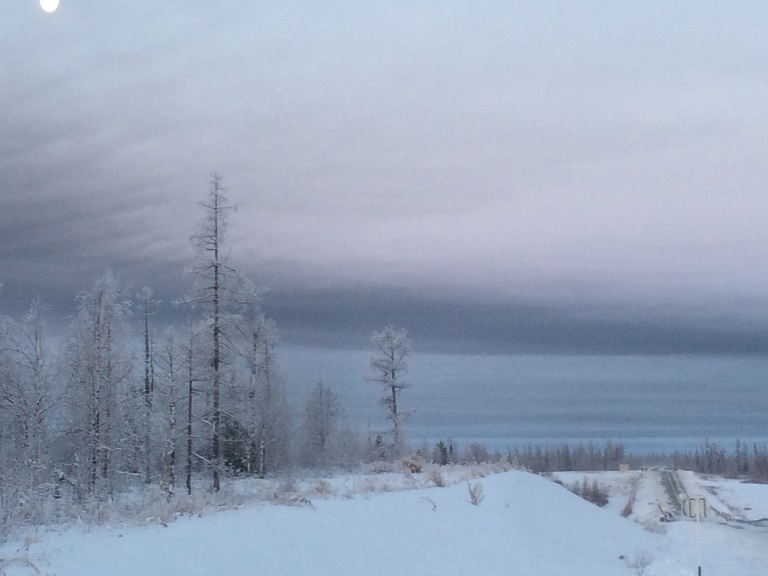
At first glance, all such projects are similar: prepare personnel and equipment, arrive at the site, install fencing, install equipment and perform commissioning ... But the environment inexorably dictates its conditions. This is not a scs in the office, in one hand holding a screwdriver, and the other brewing tea in the cooler :)
But, first things first.
The longest season in the Khanty-Mansi Autonomous Okrug and Yamal-Nenets Autonomous Okrug is the winter, which ends at the end of May. With frosts up to —55 ° C. At the same time, the winter day lasts about 4 hours.

In winter, after 2 pm, the sun is already setting.
In summer, the average temperature is 27–33 ° С. But mosquitoes, mosquitoes and other nasalism so much that it is almost impossible to work.

Precipitation is also a lot. In the summer, it rains such that nothing can be seen around at a distance of 10 meters, and in winter it is constantly necessary to clean the snow to get to work. All these conditions naturally affect the order of work. For example, piles for the fence, according to regulations, need to be immersed from 8 to 12 meters in depth, where there is permafrost. And it is necessary to drive them in the winter - in order to have time to freeze well, otherwise in the summer they will be squeezed out with water a couple of meters in height.
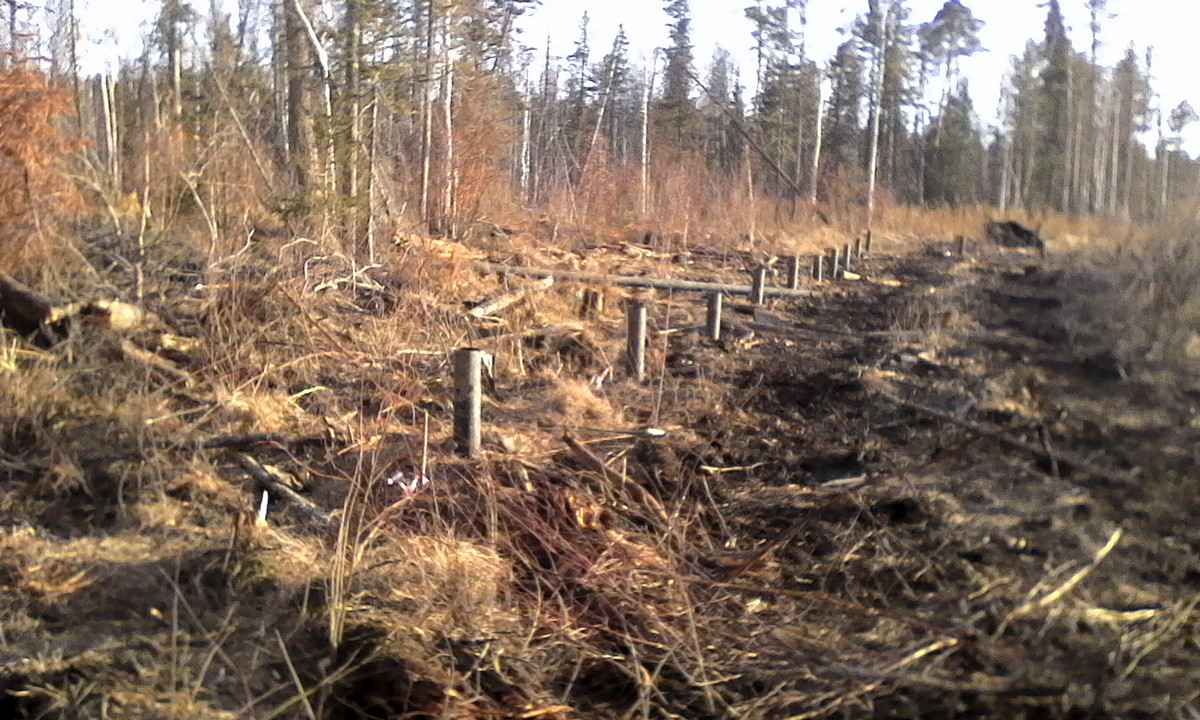
Pile field - we are preparing the future fencing
It is also necessary to take into account the temperature regime of operation for cables that will be used in the infrastructure. If the wire has installation restrictions of up to –10 ° C, then it must be laid before the end of September, otherwise frost will begin and snow will fall.
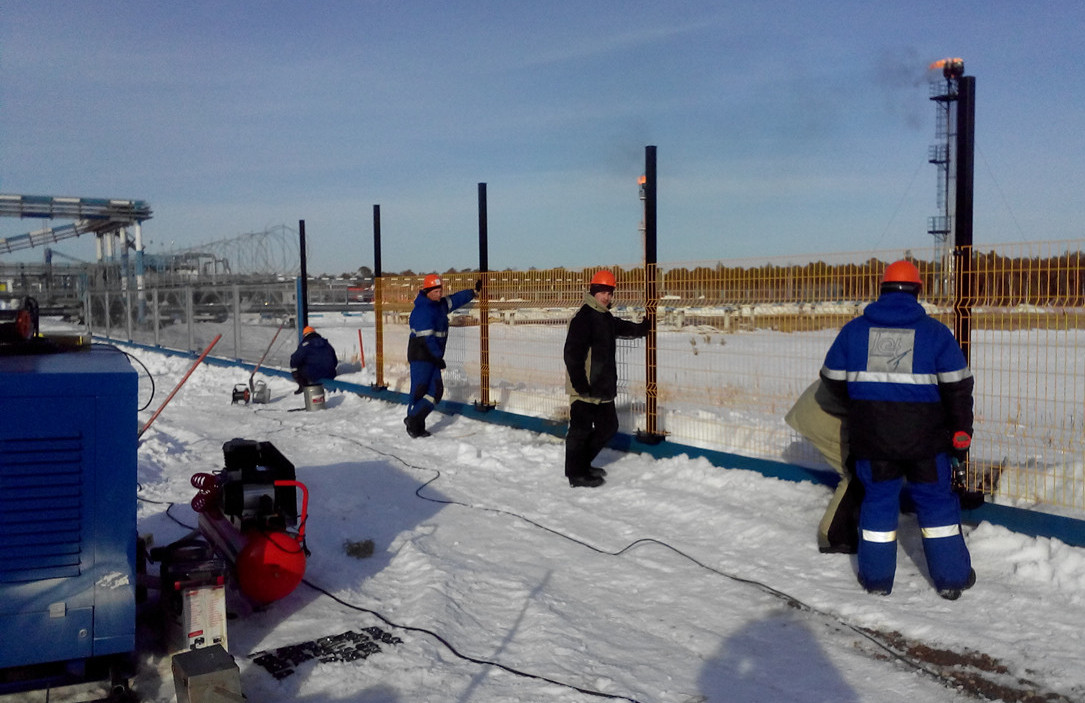
And it is also very important to know the peculiarities of the climate when you have to deliver equipment to the site. The roads in Siberia are as harsh as nature.
We will not consider the Tobolsk highway or the P – 404 highway, only Surgut can be reached by them. You have to drive and drive equipment where there are no cities and even villages for hundreds of kilometers. In this case, the roads in the "North" can be either winter (the so-called winter roads) or summer.
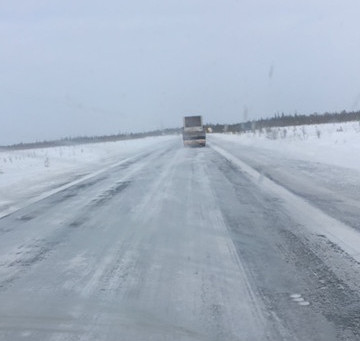
Roads are not cleaned everywhere, so they often turn into a skating rink.
In summer, the road to the deposits is usually a “primer” or “crushed stone”, but there is also a normal “concrete” or asphalt one. Although asphalt is less common than betonka. A good trail in the swamps, which are mass in the taiga, is difficult to build, long and unnecessarily expensive. Driving speed on this road - 30–40 km / h.

At first the forest is cut down, the logs are laid, on top there is sand and clay. And there is practically no clean sand here. Clay is constantly going to the soil, it has to be bulldozed and tamped down with a skating rink. There were cases that the laid layers fell into the swamp for 5 meters and the road disappeared.

The road to work. And no Moscow traffic jams!
In a few years, when the soil of such a road normalizes, crushed stone and concrete slabs are used. And after some time, the plates are equal, welded and poured with concrete. And then there is a decent lane for traffic.
So there are good roads in Siberia, but few. On the trip, get ready for the fact that the dirt will reach the hubs of the wheels.
But this is not so bad, given the main obstacles on the way - the river. In Siberia, they are very wide and deep. The main and largest of the rivers of the Tyumen region - Ob. It can be crossed by pontoon ferry, on a steamer or on a barge. However, the carrying capacity of the boats is limited, and God forbid, get on the crossing in the offseason: you can be stuck for a couple of weeks.
In winter, it seems to be easier to drive, if it were not for the frost or ice, the road becomes like a washboard.

We are going on an ice ferry across the river.
About the failures of equipment due to the cold will be slightly lower, but I would like to tell you about the case of crane transportation by dump truck here.
Once a 13-ton Kamaz dragged a 26-ton crane. And then on the way the rise of 20 degrees. The dump truck could not pull it out, and the crane literally flew into the channel, stuck in an ice arrow. Then they pulled him out for two days with the help of three excavators.
Unfortunately, there is no photo of that memorable moment. But they captured a 30-ton excavator, which descended half a meter from the winter road - they almost drowned.


And yes, refueling on local roads are very rare. Here oil is extracted, not processed :)
It is clear that people have to work on such projects on a rotational basis. Landing on the object should be at least a month. And for this period, all employees must be provided with work.
Changing people at the site is not so easy. Everyone must be certified, pass a physical examination, get the necessary admission to the training center. For some documents you need to go to the nearest town (Nizhnevartovsk, Tyumen, Novy Urengoy), which is several hundred kilometers one way. There was a case when the welder forgot the ID in the hotel. He was simply not allowed to the object, which was located a few hundred kilometers from this hotel.
With the tolerance in general is very strict, since many objects are modal. For example, if at the entrance of an employee they find alcoholic or narcotic substances, then the contractor will be fined 300 thousand rubles, and the violator himself will be blacklisted for all objects in the oil and gas forever.
There was a case when one employee brought a bottle of alcohol to the object, which he used to wipe the details of the video surveillance system - I had to go to all the permissive instances and explain that this was for work - for outdoor use, and not internal.
With such rigid orders, there are often situations when employees are out of work and warm themselves on construction trailers while the procedure for admission or approval lasts. It is enough checking and coordinating on objects, literally on each gesture the site managers, foremen, masters should receive permission.
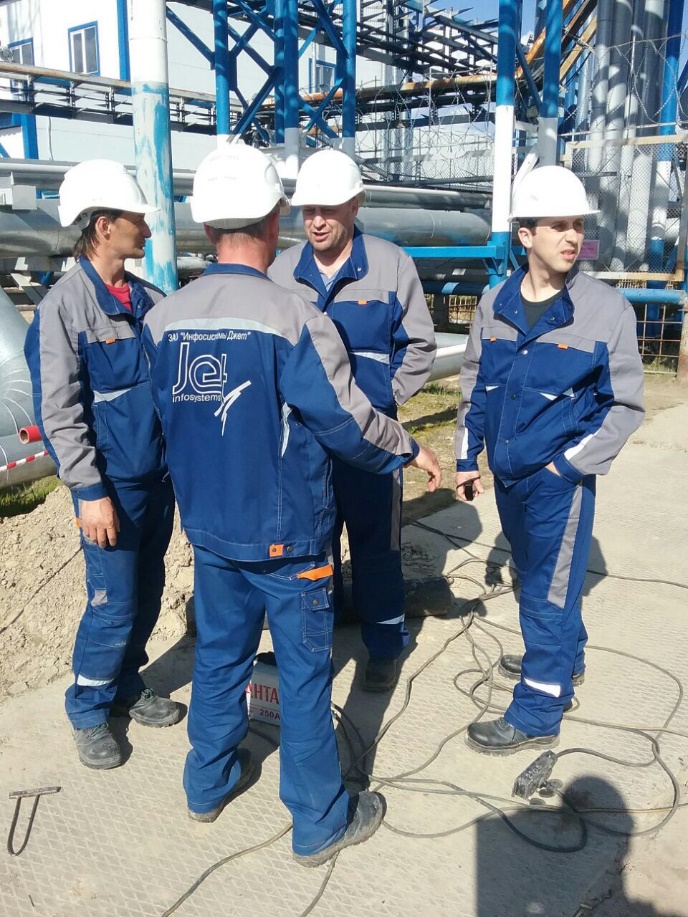
But when an emergency occurs (and in Siberia it happens more often than usual), you have to work in two shifts. And to work in open areas in public. We put additional spotlights, big tents where heat guns work, and go ahead: there is no office where you can sit out in the canteen or in the smoking room.
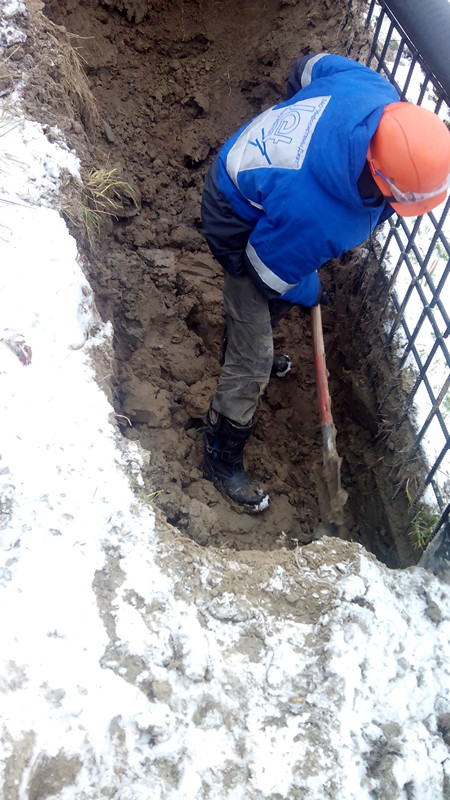
You have to dig a trench for the counter-copy along the fence manually (the equipment will not be able to drive so close and there is a risk of damage to communications) and certainly in the winter (there will be swamps in the summer).
In winter, the work-rest regime is clearly monitored, and there is a special car to which you can (or rather, need to) get warm. And if there is no car, then in a working car.
And yet it happens to fall into extreme situations. Have you ever tried to crimp a twisted pair at —40 ° C? Bare hands, because there is simply no suitable tool? Sometimes a person can do something that equipment does not stand up to, especially when deadlines are burning. Sometimes you have to cook ogolovniki (which are then racks of fencing) to the piles, lying right in the thawed patch.
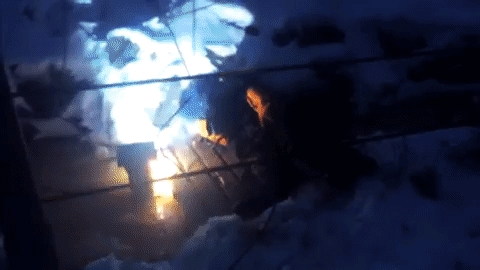
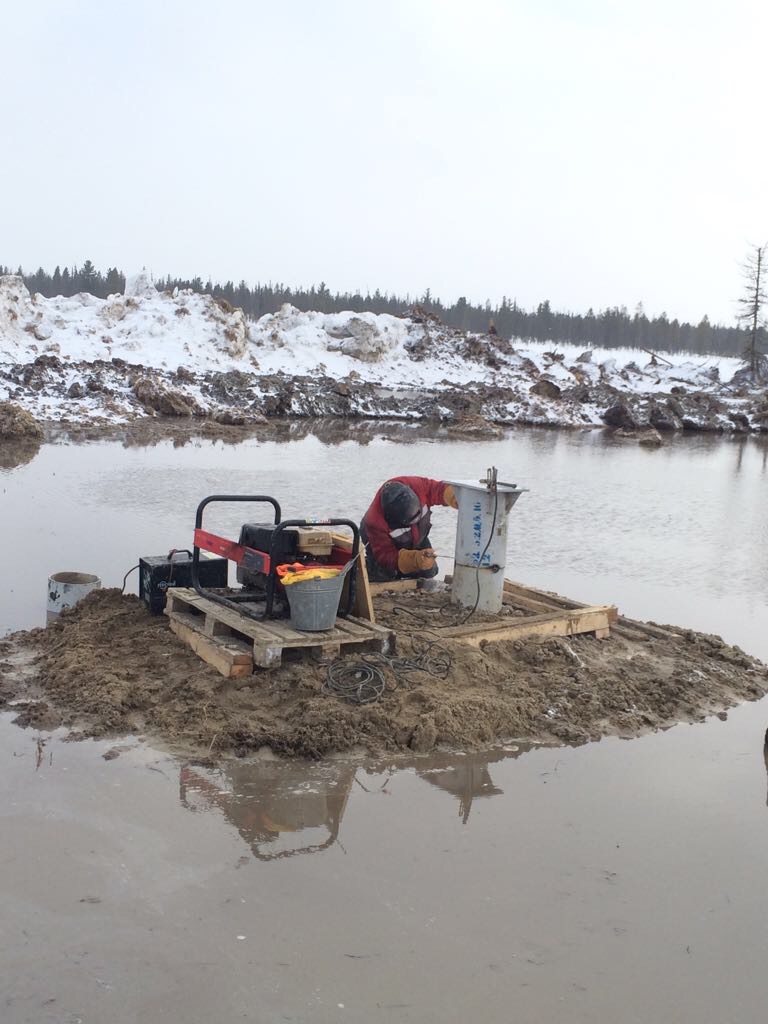
Work in eco-district: almost untouched nature, fresh air, close proximity to water bodies.

There will be power lines here.
Without this, nowhere. Although on the roads in winter cars often do not stand up. And there are many such cases. To make it clear: if the car breaks down in the taiga, where there is no active movement, at a temperature below —40 ° C, all that remains is to hope for quick help and burn the tires. In the literal sense.
Once, at —49 ° C, diesel fuel froze through the gazelle tank right on the run. There was only one way out: take the canister, pour the frozen diesel into a smaller canister and connect the supply of diesel fuel directly to the injection pump system, while the canister was in the cabin. Enough meters at 500, then the procedure was repeated. With such iterations we got to a roadside cafe, breaking 15 kilometers.
It was such that the employee went to the object at night, in the cold and stuck on the track - the engine was jammed. There is no connection, the telephone in the many kilometers of the wilderness does not catch, there is no transport on the road either: night —35 ° C. The only thing that saved the "traveler" - a blanket and a burner (gorilka, alas, was not). Warming up in this way, he sat in the cabin for about 6 hours, until he was found passing by. By the way, people never pass by in such places - they always stop.
Even if you pierced a wheel on the road in warm time (which is not uncommon - tons of different materials are transported here), you will have to chuck and wait until the passing car reports about your trouble to the BDD post, because here it often doesn’t catch only the phone, but also a walkie-talkie, and you will not give everyone a satellite phone.
And in some fields, equipment is “buried” right in the swamp or buried. Delivering it after 5–6 years of work to the “mainland” is usually not economically viable, and the contractor, for example, leaves the field, since ended his contract. What are they doing? The excavator pulls out a huge ditch, where a fully functional machinery enters, and it is filled up. However, in recent times there has been another, more "humane" trend: working machines are being taken apart for parts.
If you watched the series "Adaptation", then you can represent the relationship between oilmen and the local population in the person of the Nenets, Khanty and Mansi. It is the natives who are considered to be the masters in Siberia: this is their land, and not a single serious issue can be solved without their participation.
A local resident can go to any of the "comers" and ask for fuel - he can not refuse. They need “fuel” for snowmobiles, which are bought for them by the same oilmen.
By the way, local access to any object is open without any restriction. Often, right on the territory of the deposits, representatives of northern peoples organize their fairs.

It is a typical picture (they themselves witnessed): a helicopter flying to a remote site “hangs” for a minute “about a meter from the ground in the center of a swamp to pick up and transport a couple bags of cranberries, fur and other good things at the request of a local hunter or huntsman .
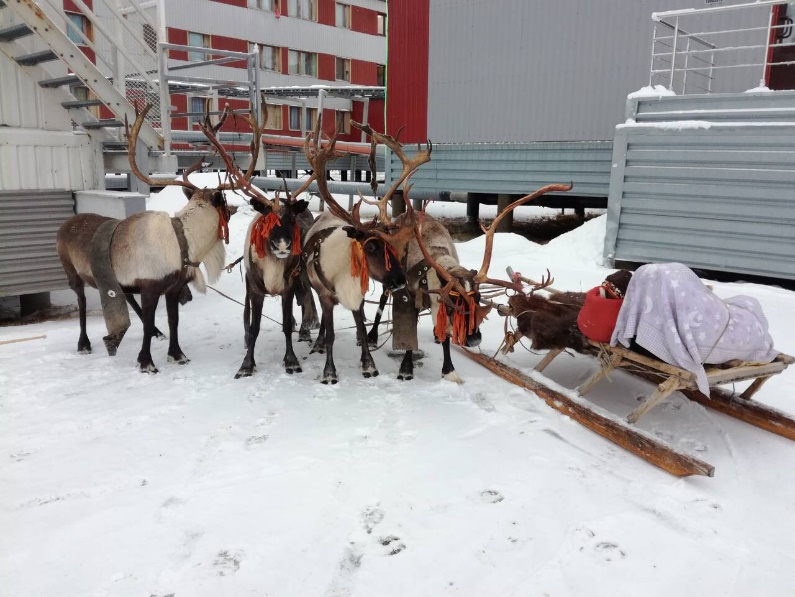
However, the locals do not abuse their position, they behave quite adequately: a hunter can leave the second bag of cranberries to the pilot in gratitude for the help. In general, mutual assistance here is a completely normal phenomenon: today you helped, tomorrow you helped. There is not enough material or a welder is needed - builders will help out. Barter is very common here - without it, nowhere.
If it is possible to agree with human beings living in the North, then this does not happen often with representatives of the fauna. Bears themselves here also feel full owners. Therefore, the safety rules here are quite harsh: even when stopped on the highway “to smoke”, it is better not to leave the car. It happens that the bears themselves come to the rotational camp in search of food and gutted trash.
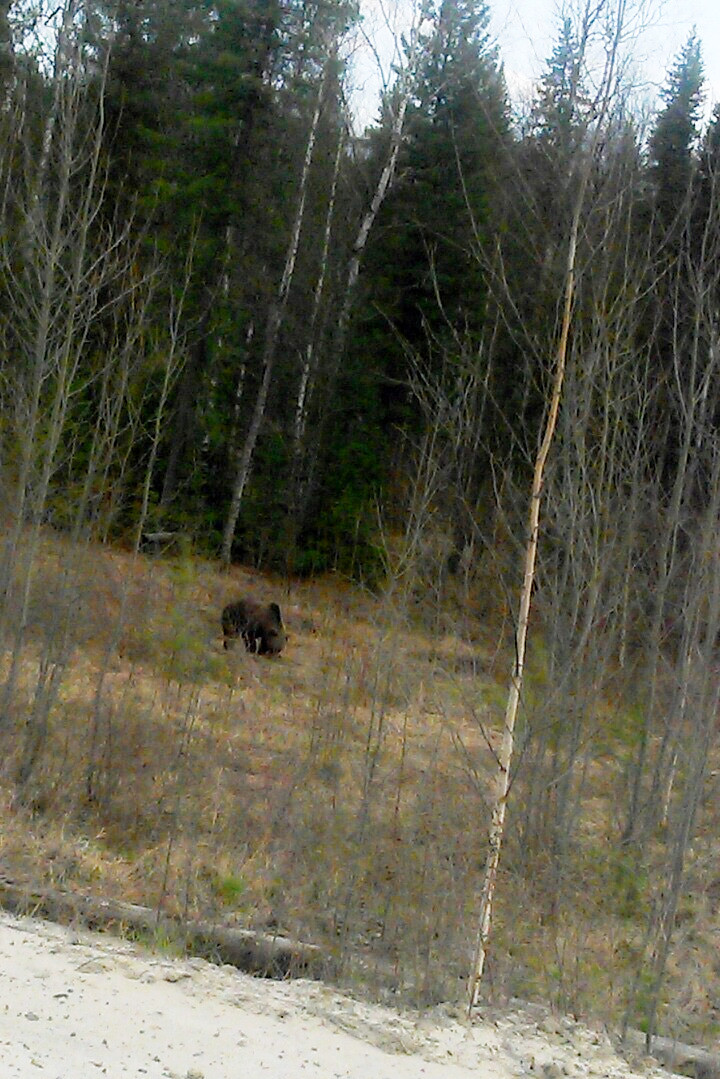
To protect people, hunters are on duty in the field who can put a crazy bear to sleep - they are killed only as a last resort.
It is known that bears are afraid of strong noise. There are even recommendations: to scare away the beast, carry a ratchet or a vuvuzella :) In a pinch, you can do your best to knock with a spoon on a metal mug.
Even to scare bears on the grounds and in the villages keep dogs. Although they themselves, at times, suffer from wild wildlife. Because another scourge of this area is the viper. There are a lot of them here, both people and dogs suffer from bites.


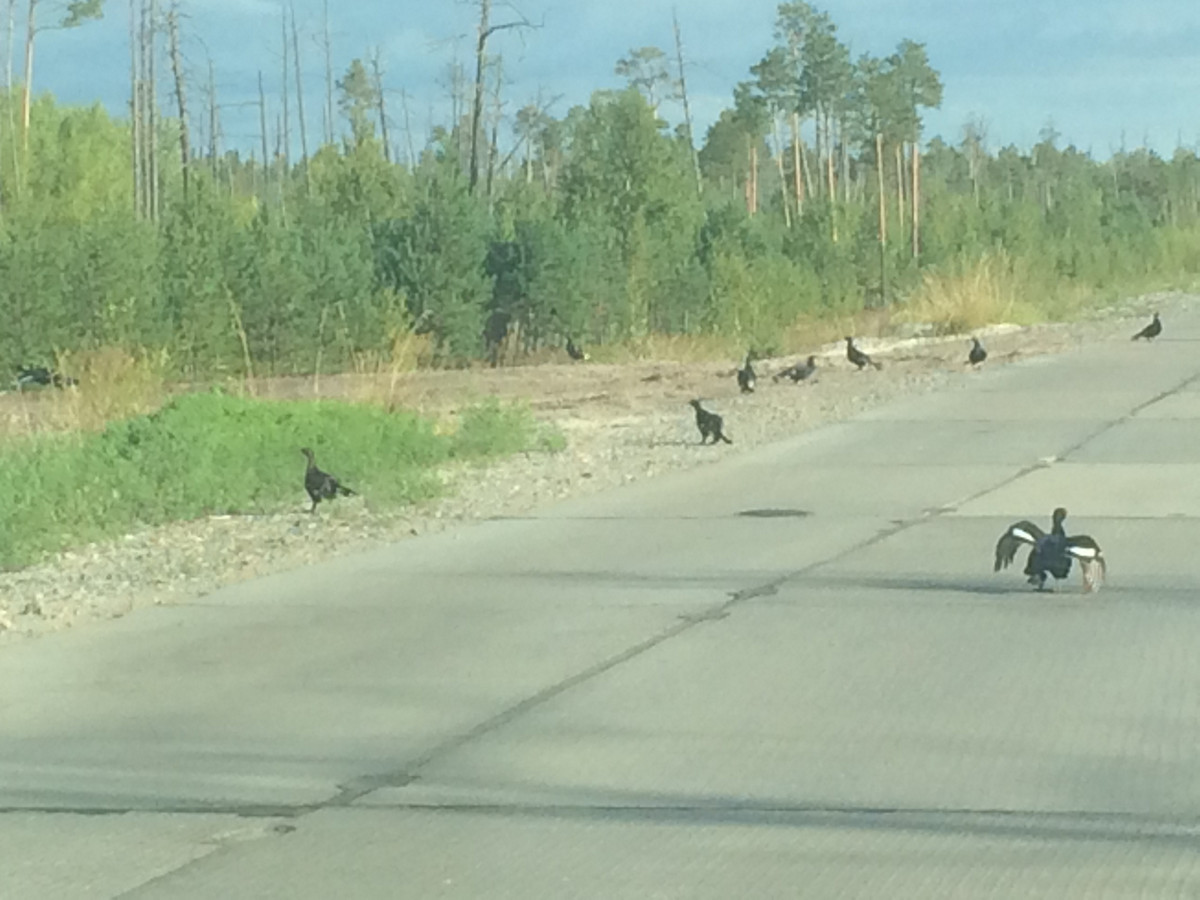
As the concrete roads pass through the swamp, the vipers crawl out to warm up and “breathe the air” right on the roadway, where they die in packs under the wheels. I remember one “natural-loving” driver stopped and tried to drop the snake, so as not to crush, for which he was thanked with a bite in his finger.
* * *
Are you still acutely lacking the benefits of civilization? 4G doesn’t work everywhere, and Pay Pass is far from being in every tent, but updates, from which the iPhone is buggy, is a separate song ...? Well, you definitely need to work on the vast Siberian expanses of our vast Motherland. Urban melancholy as a hand will remove;)

Yevgeny Titenok, lead project manager, Jet Infosystems

At first glance, all such projects are similar: prepare personnel and equipment, arrive at the site, install fencing, install equipment and perform commissioning ... But the environment inexorably dictates its conditions. This is not a scs in the office, in one hand holding a screwdriver, and the other brewing tea in the cooler :)
But, first things first.
Climate
The longest season in the Khanty-Mansi Autonomous Okrug and Yamal-Nenets Autonomous Okrug is the winter, which ends at the end of May. With frosts up to —55 ° C. At the same time, the winter day lasts about 4 hours.

In winter, after 2 pm, the sun is already setting.
In summer, the average temperature is 27–33 ° С. But mosquitoes, mosquitoes and other nasalism so much that it is almost impossible to work.

Precipitation is also a lot. In the summer, it rains such that nothing can be seen around at a distance of 10 meters, and in winter it is constantly necessary to clean the snow to get to work. All these conditions naturally affect the order of work. For example, piles for the fence, according to regulations, need to be immersed from 8 to 12 meters in depth, where there is permafrost. And it is necessary to drive them in the winter - in order to have time to freeze well, otherwise in the summer they will be squeezed out with water a couple of meters in height.

Pile field - we are preparing the future fencing
It is also necessary to take into account the temperature regime of operation for cables that will be used in the infrastructure. If the wire has installation restrictions of up to –10 ° C, then it must be laid before the end of September, otherwise frost will begin and snow will fall.

And it is also very important to know the peculiarities of the climate when you have to deliver equipment to the site. The roads in Siberia are as harsh as nature.
Roads
We will not consider the Tobolsk highway or the P – 404 highway, only Surgut can be reached by them. You have to drive and drive equipment where there are no cities and even villages for hundreds of kilometers. In this case, the roads in the "North" can be either winter (the so-called winter roads) or summer.

Roads are not cleaned everywhere, so they often turn into a skating rink.
In summer, the road to the deposits is usually a “primer” or “crushed stone”, but there is also a normal “concrete” or asphalt one. Although asphalt is less common than betonka. A good trail in the swamps, which are mass in the taiga, is difficult to build, long and unnecessarily expensive. Driving speed on this road - 30–40 km / h.

At first the forest is cut down, the logs are laid, on top there is sand and clay. And there is practically no clean sand here. Clay is constantly going to the soil, it has to be bulldozed and tamped down with a skating rink. There were cases that the laid layers fell into the swamp for 5 meters and the road disappeared.

The road to work. And no Moscow traffic jams!
In a few years, when the soil of such a road normalizes, crushed stone and concrete slabs are used. And after some time, the plates are equal, welded and poured with concrete. And then there is a decent lane for traffic.
So there are good roads in Siberia, but few. On the trip, get ready for the fact that the dirt will reach the hubs of the wheels.
But this is not so bad, given the main obstacles on the way - the river. In Siberia, they are very wide and deep. The main and largest of the rivers of the Tyumen region - Ob. It can be crossed by pontoon ferry, on a steamer or on a barge. However, the carrying capacity of the boats is limited, and God forbid, get on the crossing in the offseason: you can be stuck for a couple of weeks.
In winter, it seems to be easier to drive, if it were not for the frost or ice, the road becomes like a washboard.

We are going on an ice ferry across the river.
About the failures of equipment due to the cold will be slightly lower, but I would like to tell you about the case of crane transportation by dump truck here.
Once a 13-ton Kamaz dragged a 26-ton crane. And then on the way the rise of 20 degrees. The dump truck could not pull it out, and the crane literally flew into the channel, stuck in an ice arrow. Then they pulled him out for two days with the help of three excavators.
Unfortunately, there is no photo of that memorable moment. But they captured a 30-ton excavator, which descended half a meter from the winter road - they almost drowned.


And yes, refueling on local roads are very rare. Here oil is extracted, not processed :)
People
It is clear that people have to work on such projects on a rotational basis. Landing on the object should be at least a month. And for this period, all employees must be provided with work.
Changing people at the site is not so easy. Everyone must be certified, pass a physical examination, get the necessary admission to the training center. For some documents you need to go to the nearest town (Nizhnevartovsk, Tyumen, Novy Urengoy), which is several hundred kilometers one way. There was a case when the welder forgot the ID in the hotel. He was simply not allowed to the object, which was located a few hundred kilometers from this hotel.
With the tolerance in general is very strict, since many objects are modal. For example, if at the entrance of an employee they find alcoholic or narcotic substances, then the contractor will be fined 300 thousand rubles, and the violator himself will be blacklisted for all objects in the oil and gas forever.
There was a case when one employee brought a bottle of alcohol to the object, which he used to wipe the details of the video surveillance system - I had to go to all the permissive instances and explain that this was for work - for outdoor use, and not internal.
With such rigid orders, there are often situations when employees are out of work and warm themselves on construction trailers while the procedure for admission or approval lasts. It is enough checking and coordinating on objects, literally on each gesture the site managers, foremen, masters should receive permission.

But when an emergency occurs (and in Siberia it happens more often than usual), you have to work in two shifts. And to work in open areas in public. We put additional spotlights, big tents where heat guns work, and go ahead: there is no office where you can sit out in the canteen or in the smoking room.

You have to dig a trench for the counter-copy along the fence manually (the equipment will not be able to drive so close and there is a risk of damage to communications) and certainly in the winter (there will be swamps in the summer).
In winter, the work-rest regime is clearly monitored, and there is a special car to which you can (or rather, need to) get warm. And if there is no car, then in a working car.
And yet it happens to fall into extreme situations. Have you ever tried to crimp a twisted pair at —40 ° C? Bare hands, because there is simply no suitable tool? Sometimes a person can do something that equipment does not stand up to, especially when deadlines are burning. Sometimes you have to cook ogolovniki (which are then racks of fencing) to the piles, lying right in the thawed patch.


Work in eco-district: almost untouched nature, fresh air, close proximity to water bodies.

There will be power lines here.
Engineering and mechanization
Without this, nowhere. Although on the roads in winter cars often do not stand up. And there are many such cases. To make it clear: if the car breaks down in the taiga, where there is no active movement, at a temperature below —40 ° C, all that remains is to hope for quick help and burn the tires. In the literal sense.
Once, at —49 ° C, diesel fuel froze through the gazelle tank right on the run. There was only one way out: take the canister, pour the frozen diesel into a smaller canister and connect the supply of diesel fuel directly to the injection pump system, while the canister was in the cabin. Enough meters at 500, then the procedure was repeated. With such iterations we got to a roadside cafe, breaking 15 kilometers.
It was such that the employee went to the object at night, in the cold and stuck on the track - the engine was jammed. There is no connection, the telephone in the many kilometers of the wilderness does not catch, there is no transport on the road either: night —35 ° C. The only thing that saved the "traveler" - a blanket and a burner (gorilka, alas, was not). Warming up in this way, he sat in the cabin for about 6 hours, until he was found passing by. By the way, people never pass by in such places - they always stop.
Even if you pierced a wheel on the road in warm time (which is not uncommon - tons of different materials are transported here), you will have to chuck and wait until the passing car reports about your trouble to the BDD post, because here it often doesn’t catch only the phone, but also a walkie-talkie, and you will not give everyone a satellite phone.
And in some fields, equipment is “buried” right in the swamp or buried. Delivering it after 5–6 years of work to the “mainland” is usually not economically viable, and the contractor, for example, leaves the field, since ended his contract. What are they doing? The excavator pulls out a huge ditch, where a fully functional machinery enters, and it is filled up. However, in recent times there has been another, more "humane" trend: working machines are being taken apart for parts.
Features of mentality
If you watched the series "Adaptation", then you can represent the relationship between oilmen and the local population in the person of the Nenets, Khanty and Mansi. It is the natives who are considered to be the masters in Siberia: this is their land, and not a single serious issue can be solved without their participation.
A local resident can go to any of the "comers" and ask for fuel - he can not refuse. They need “fuel” for snowmobiles, which are bought for them by the same oilmen.
By the way, local access to any object is open without any restriction. Often, right on the territory of the deposits, representatives of northern peoples organize their fairs.

It is a typical picture (they themselves witnessed): a helicopter flying to a remote site “hangs” for a minute “about a meter from the ground in the center of a swamp to pick up and transport a couple bags of cranberries, fur and other good things at the request of a local hunter or huntsman .

However, the locals do not abuse their position, they behave quite adequately: a hunter can leave the second bag of cranberries to the pilot in gratitude for the help. In general, mutual assistance here is a completely normal phenomenon: today you helped, tomorrow you helped. There is not enough material or a welder is needed - builders will help out. Barter is very common here - without it, nowhere.
Animals
If it is possible to agree with human beings living in the North, then this does not happen often with representatives of the fauna. Bears themselves here also feel full owners. Therefore, the safety rules here are quite harsh: even when stopped on the highway “to smoke”, it is better not to leave the car. It happens that the bears themselves come to the rotational camp in search of food and gutted trash.

To protect people, hunters are on duty in the field who can put a crazy bear to sleep - they are killed only as a last resort.
It is known that bears are afraid of strong noise. There are even recommendations: to scare away the beast, carry a ratchet or a vuvuzella :) In a pinch, you can do your best to knock with a spoon on a metal mug.
Even to scare bears on the grounds and in the villages keep dogs. Although they themselves, at times, suffer from wild wildlife. Because another scourge of this area is the viper. There are a lot of them here, both people and dogs suffer from bites.



As the concrete roads pass through the swamp, the vipers crawl out to warm up and “breathe the air” right on the roadway, where they die in packs under the wheels. I remember one “natural-loving” driver stopped and tried to drop the snake, so as not to crush, for which he was thanked with a bite in his finger.
* * *
Are you still acutely lacking the benefits of civilization? 4G doesn’t work everywhere, and Pay Pass is far from being in every tent, but updates, from which the iPhone is buggy, is a separate song ...? Well, you definitely need to work on the vast Siberian expanses of our vast Motherland. Urban melancholy as a hand will remove;)

Yevgeny Titenok, lead project manager, Jet Infosystems
